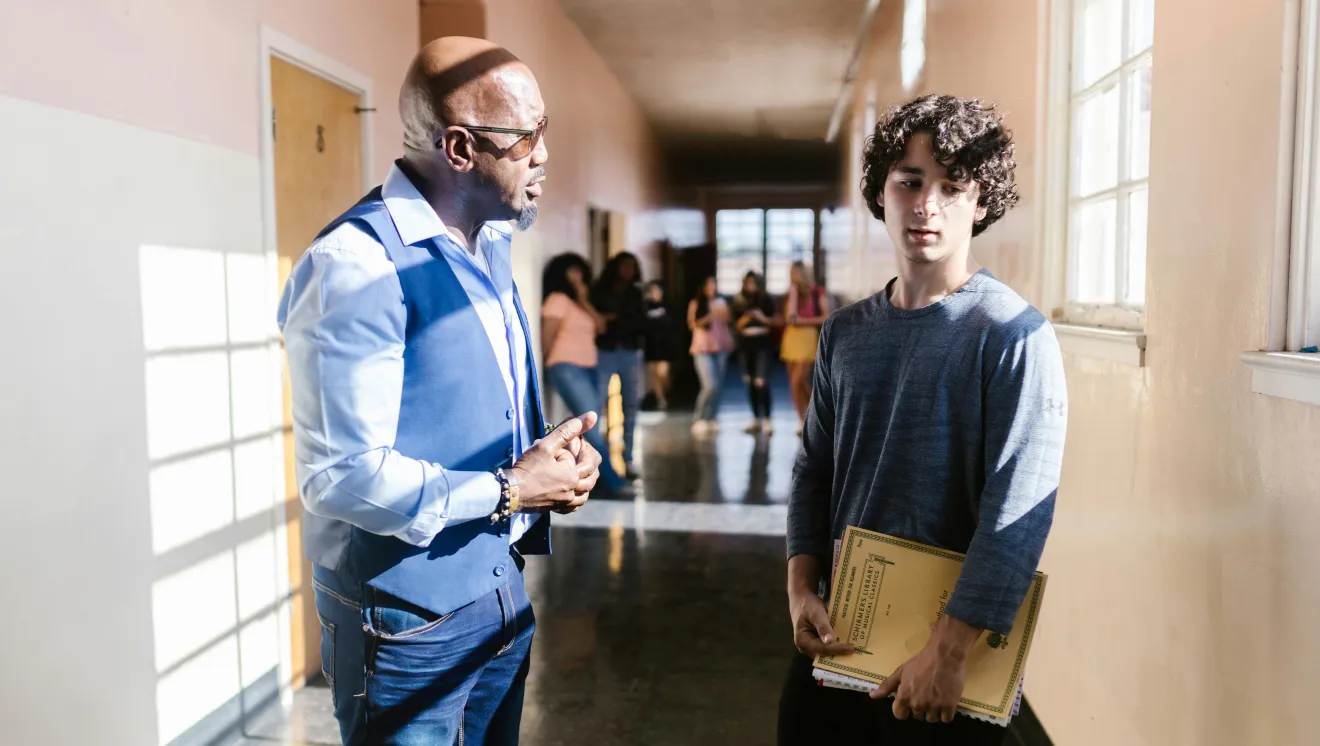From Struggles to Strengths: Building a World Where Every Student Can Succeed
- News
- Events

How School-Based TBS Specialists Make a Difference in High Schoolers' Lives
High school is rarely easy, as students navigate academics, peer pressure, and the looming prospect of adulthood. Teenagers carry heavy loads, but for students with intellectual and developmental disabilities (I/DD) and behavioral health challenges, those burdens often go unseen and unaddressed.
School-based behavioral health staff say the stress begins long before the first bell rings.
“At school, noticing kids who didn’t eat or didn’t sleep or aren’t prepared—those are the biggest stressors for the kids that I see,” explains Emma Huffman, a therapeutic behavior support (TBS) specialist who works directly with students. She and fellow TBS worker, Rey Phillips, sat down alongside Clinical Supervisor, Shelby Rudloff, to discuss the reality of student life amongst populations with I/DD and behavioral health problems.
Many students arrive at school already lacking basic needs and the necessary structure for successful learning. This structure starts at home, where some students are thrust into caregiving roles, managing younger siblings or household responsibilities while parents are absent due to work or other obligations. “One of the invisible loads is being a caregiver when they return home,” says Rudloff, who oversees the school-based behavioral health team. “They’re helping care for a sibling or making dinner, instead of just being a child that also needs help.”
Academically, the situation remains similarly tumultuous. In the alternative placements many of these students face, support is limited. “A lot of these students are shuffled through each grade level without really having those foundational skills,” Rudloff adds.
All three specialists agree that routines at home can help set students up for success. Even simple strategies, such as walkthroughs before the school year or special events, can make all the difference.
“One suggestion I made was to visit the school weeks prior, do a walkthrough, sit in a seat, get adjusted to the environment,” says Phillips. “Picking out clothes, setting alarms—it makes things less stressful.”
Equally important is what happens when students come home. They need space to decompress before diving into homework or chores. “They just came from a potentially stressful environment,” Huffman explains. “What works best for kids is typically letting them have that time to rest when they get home.”
In an ideal world, parents would facilitate walkthroughs, teachers' meet-and-greets, and time spent decompressing; however, reality tells a different story.
Despite their best intentions, parents sometimes set their children up for failure by holding them to unrealistic expectations.
“Parents kind of see their kid as the same as everyone else, without considering the mental health component,” Phillips notes. “They think they can just drop off their kid and say bye, when really some students need to be walked to class, at least for a while.”
High schoolers are often treated like adults one moment and small children the next. “It’s confusing when a 17-year-old is treated like they should function as a 28-year-old,” Rudloff explains. “Especially if they already have a job or big responsibilities. They’re still kids.”
For many students, the absence of their parents is a significant stressor in itself. Some young people are effectively parenting themselves and at times, their families.
“Unfortunately, in my demographic, the parents are not partners,” Rudloff shares. “A lot of times, my students become the parent.”
That’s where school-based specialists step in. Phillips and Huffman often role-play conversations with students to help them ask for academic support or navigate conflict. They check grades, set goals, and hold students accountable for their work. “We help them practice what that looks like. Who you can take concerns to, how you can ask for help,” Huffman says.
Beyond academic aid, therapeutic support specialists provide conflict resolution practices, coping skills, and even basic life skills, such as sleep hygiene and healthy routines. They also connect students to community resources, including everything from food and clothing to emergency housing.
“One of my main resources is Huckleberry House,” Phillips says. “When kids can’t take it and run away, I call them for safe housing. Sometimes it’s food, sometimes clothing, sometimes Medicaid. We help them connect to what they need.”
Perhaps the most impactful role TBS workers play is simply being present. “A lot of kids don’t have an adult who has their full attention on them,” Huffman adds. “I try to be that ear.”
Parents who want to be active partners can start by communicating regularly with their child's school. In action, this involves more than just showing up at IEP meetings. “Having that list of things as a parent, and being in constant communication with the school, is important,” Rudloff explains.
Resources are available to help families navigate this process, including the Ohio Board of Education’s Parent Rights Guide for IEPs.
High school students with I/DD and behavioral health needs are asked to carry far more than their academic workload. They juggle caregiving roles, jobs, academics, and the heavy work of self-advocacy. Without coordinated support at home and school, many risk falling behind or burning out.
“They’re not asking for special treatment,” Ray says. “They’re asking for a fair shot at thriving.”
For the parent or teen in your community who may benefit from additional resources, encourage them to connect with a TBS worker.
Here is a list of things that the TBS role can provide:
- Individual and group services
- Social-emotional learning
- Promote student success
- Enhance well-being
- Assist with skills to achieve academic success and reach graduation.
- Conflict resolution and other social skills
- Healthy relationships
- Crisis management
- Daily living skills (self-care, money management, leisure skills, etc.)
- Executive functioning skills (decision-making, organization, planning, etc.)
- Future planning
- Interventions to identify and help reduce or eliminate barriers to success in education and life
- Psychoeducation for parents
- Linkage to vital resources
- Medical services (primary care, dental, etc.)
- Transportation
- Life skills
- Community resources and connections
Everyone deserves the chance to thrive. Whether you’re a parent, caregiver, or individual seeking support, Boundless is here to walk alongside you. Take the first step by filling out our referral form.





